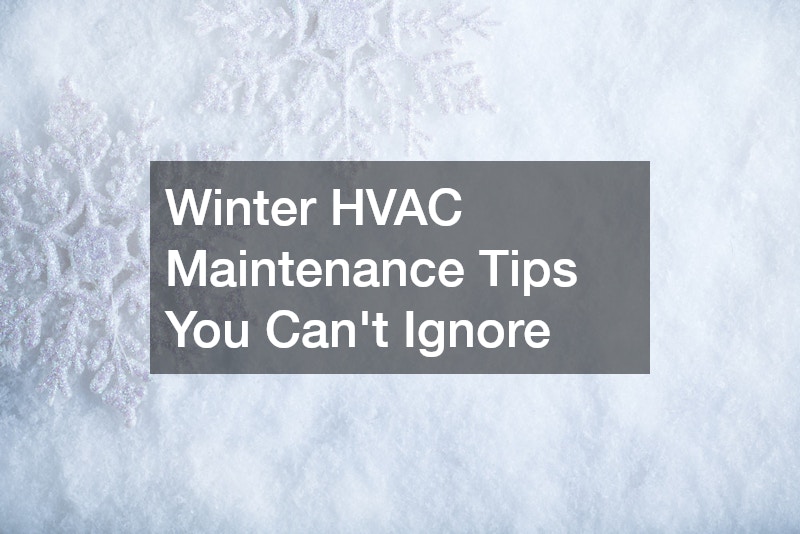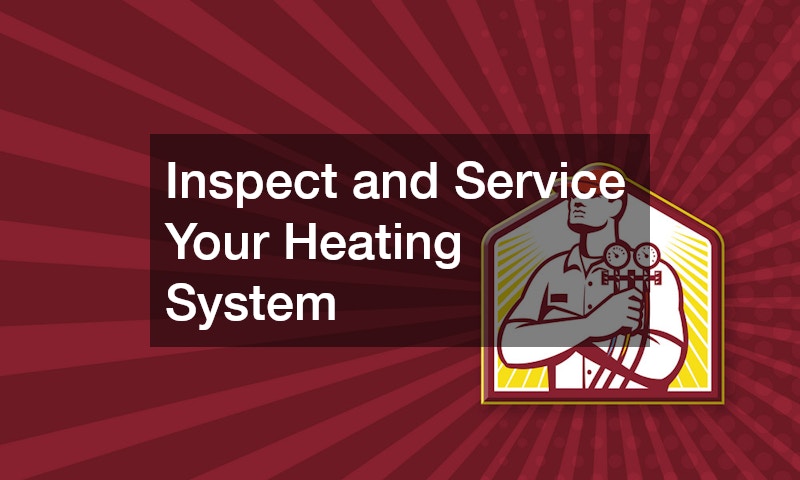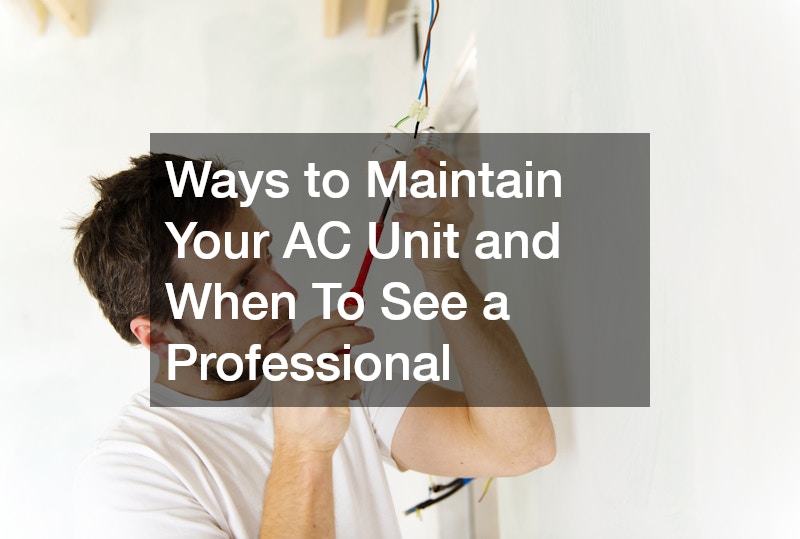As cold weather settles in, many homeowners find themselves bracing for frigid temperatures and higher energy bills. However, preparing your heating system ahead of time can make a significant difference in both comfort and costs. Comprehensive winter HVAC maintenance is one of the most effective ways to keep your home warm and your energy budget in check. A thorough approach to winter HVAC maintenance can also help you avoid unexpected breakdowns in the middle of a freezing night.
In this blog, we’ll explore some must-know winter maintenance tips to help you navigate the chilly season with confidence. We’ll also address what to do when problems arise, from scheduling a furnace repair to enlisting the help of heating contractors for more complex tasks. Whether you’re a new homeowner or looking for a refresher, read on for essential advice you simply can’t ignore.
The Importance of Winter HVAC Maintenance
Before diving into the specific tips, let’s talk about why winter HVAC maintenance matters so much. When the temperatures drop, your HVAC system is called upon to work harder than at any other time of the year. Heating systems, whether powered by electricity, gas, or oil, can break down if not properly cared for. Scheduling routine check-ups helps you avoid emergency calls for furnace repair, or even more expensive, time-consuming replacements.
Prolong the Lifespan of Your System
One of the key reasons for regular HVAC maintenance is that it helps your equipment last longer. Dust buildup, clogged filters, and worn-out parts can compromise your system’s efficiency and accelerate wear and tear. By catching minor issues early, you can prevent them from turning into bigger, costlier problems. This extends the lifespan of your HVAC system and reduces the need for frequent heating system repairs.
Maintain Consistent Comfort
Nobody wants to wake up in the middle of the night to a cold house. A system that’s well-maintained will deliver consistent heat, ensuring you stay warm throughout winter’s harshest nights. It’ll also help maintain better indoor air quality, an often-overlooked factor for overall health and wellness. If someone in your household struggles with allergies or respiratory issues, a clean, well-operating HVAC system is especially important.
Enhance Energy Efficiency
Efficient systems use less energy to heat your home, resulting in lower monthly bills. Dirty filters, leaking ducts, or malfunctioning thermostats can force your system to work overtime, leading to a spike in energy usage. By taking the time for winter HVAC maintenance, you ensure that your heating system runs at peak efficiency. You’ll feel the benefits in both your comfort and your bank account.
Start With a Thorough Inspection
A good starting point for any winter HVAC maintenance plan is a comprehensive inspection. This often involves hiring reputable heating contractors who have the experience and expertise to spot issues you might miss. However, even before you pick up the phone to call a professional, you can perform a basic check of your system on your own.
Visual Checks
- Inspect for Leaks or Rust: Look for any signs of rust on ductwork or your heating unit. Rust may indicate that there’s a moisture issue or a slow leak.
- Check Vents and Registers: Make sure they are not obstructed by furniture or other items. Blocked vents can reduce airflow and make your HVAC system work harder.
- Listen for Unusual Noises: Strange rattling, grinding, or squealing noises could point to a mechanical issue.
When to Call a Pro
If your inspection reveals more complex issues—like a cracked heat exchanger or significant ductwork leaks—it’s time to call in professional heating services. Some homeowners may be tempted to fix these issues themselves, but improper repairs can lead to safety hazards and even void warranties. Experienced heating contractors can perform a detailed inspection and handle any necessary heating system repairs correctly, ensuring you’re not left in the cold.
Replace and Maintain Filters
One of the simplest yet most critical tasks in HVAC maintenance is keeping your filters clean or replacing them as needed. Dirty filters restrict airflow, force your system to work harder, and can ultimately lead to premature breakdowns. A clean filter will improve airflow, enhance indoor air quality, and ensure your home warms up more efficiently.
How Often to Replace Filters
Most HVAC experts recommend replacing disposable filters every one to three months, depending on factors like usage and indoor air quality requirements. If you have pets or someone in your household with allergies, you may need to replace the filters more frequently.
Upgrading to Better Filters
If you live in an area with high pollen counts, or if air quality is a concern, you might consider investing in higher-quality filters or even a whole-home air purification system. These can be more expensive initially, but they often pay off in the long run by improving HVAC performance and air quality.
Schedule Professional Maintenance
While there’s a lot you can do yourself, nothing beats the thoroughness of a professional tune-up. Professional heating services typically include a detailed inspection of all components, lubrication of moving parts, cleaning of internal elements, and adjustment of settings to optimize performance. By scheduling professional maintenance at least once a year—ideally in the fall—you catch potential issues before they escalate into full-blown emergencies.
The Role of Heating Contractors
Professional heating contractors are familiar with the nuances of different heating systems. Whether you rely on a furnace, boiler, or heat pump, they know where to look for wear and tear, leaks, or malfunctions. Additionally, if your system is fueled by oil, many contractors offer heating oil delivery and can ensure your tank is full and ready for the season.
Keep an Eye on Your Thermostat
Your thermostat is the control center for your heating system. It’s crucial to make sure it’s calibrated correctly and functioning well. A faulty thermostat can lead to uneven temperatures, inconsistent performance, and higher energy bills.
Programmable and Smart Thermostats
If you haven’t yet upgraded to a programmable or smart thermostat, HVAC maintenance season is an excellent time to consider it. These thermostats allow you to schedule temperature changes or even control heating remotely from your smartphone. This can lead to significant energy savings, especially if you’re away from home for extended periods.
Simple Troubleshooting Tips
- Check the Batteries: If your thermostat runs on batteries, low battery power can lead to erratic functioning.
- Location Matters: Make sure your thermostat isn’t placed near drafty windows, doors, or heat sources like lamps that could skew its readings.
Don’t Forget About Proper Ventilation
When you think about HVAC maintenance, it’s easy to focus solely on heating components. However, proper ventilation is essential for both comfort and health. Sealing your home too tightly can trap stale air, leading to moisture build-up, mold growth, and other issues.
Balancing Insulation and Fresh Air
There’s a fine line between insulating your home to retain heat and allowing enough fresh air to circulate. Consider installing or upgrading exhaust fans in kitchens and bathrooms. Opening windows occasionally for short periods can also help improve indoor air quality without drastically increasing heating costs.
Check Your Ductwork
Leaky ducts are a common culprit of poor ventilation and heat loss. If your ductwork is riddled with gaps and holes, you’ll lose heated air before it even reaches your living space. Sealing and insulating ducts can improve airflow and make your system more efficient, which is a key component of effective winter HVAC maintenance.
Inspect and Service Your Heating System
Whether you have a furnace, boiler, or heat pump, a thorough inspection is essential. Furnace repair is one of the most common calls heating contractors receive during the winter months, so it’s wise to take a proactive approach.
Furnaces
- Clean and Inspect Burners: Dirty or misaligned burners can lead to inefficient combustion, higher energy bills, and potential safety hazards.
- Check the Blower Motor: The blower motor circulates warm air through your home. If it’s dirty or malfunctioning, your system won’t heat as effectively.
Boilers
- Flush the Boiler: Sediment buildup inside the boiler can reduce efficiency and cause internal damage. A professional can perform a boiler flush as part of winter HVAC maintenance.
- Inspect Pressure Valves: Excessive or low pressure can be a sign of a bigger issue. A professional inspection will ensure the boiler is operating within safe limits.
Heat Pumps
- Clean the Outdoor Unit: Make sure the outdoor coil is free of debris like leaves, twigs, and snow buildup. Restricted airflow will force the heat pump to work harder.
- Check for Refrigerant Leaks: Low refrigerant levels can significantly reduce heating capacity. If you suspect a leak, contact heating contractors for a thorough inspection.
Pay Attention to Your Water Heater
Your water heater works year-round, but winter can place additional strain on this vital piece of equipment. Whether you have a traditional tank water heater or have opted for a more energy-efficient tankless water heater install, it’s important to ensure this system is in good shape for the colder months.
Traditional Water Heaters
- Flush the Tank: Sediment can build up in the bottom of your tank, reducing efficiency and hot water availability. Flushing the tank can remove this sediment.
- Check the Temperature and Pressure Relief Valve: This valve is a critical safety component. Regular checks ensure it’s not stuck and will open when necessary to relieve pressure.
- Insulate the Tank: Adding an insulating blanket can help maintain temperatures and reduce energy usage.
Tankless Water Heaters
- Schedule Periodic Descaling: Mineral deposits can accumulate in tankless units. Descaling helps maintain optimal performance.
- Check Venting: Proper venting is essential for safety and efficiency. Make sure there are no obstructions in the intake or exhaust pipes.
When to Seek Professional Help
If you hear loud noises (like banging or popping) or notice a sudden drop in water temperature, it’s time for professional water heater repair. While some minor tasks can be DIY, more complex issues—like a failing heating element or severe sediment buildup—require an expert’s touch.
Ensure Your Fuel Supply Is Reliable
If you rely on propane or oil to heat your home, ensuring a steady fuel supply is crucial. Running out of fuel in the dead of winter is not only inconvenient but can also damage your heating system.
Heating Oil Delivery
Planning is key. Schedule your heating oil delivery well in advance of extreme weather conditions. Keep an eye on your tank’s gauge, and don’t wait until it’s nearly empty to place an order. Some companies even offer automatic delivery programs that monitor your usage and ensure you never run out of oil.
Propane Delivery and Safety
If you use propane, it’s equally important to monitor your tank. Also, know how to spot signs of a leak—propane has a distinct, rotten-egg-like odor. If you ever smell gas around your appliances or your tank, shut everything off and contact your propane supplier immediately.
Prepare for the Unexpected
Even the best-maintained systems can have unexpected issues. From severe cold snaps to mechanical failures, you should have a plan in place for any heating emergency.
Emergency Contacts
Keep a list of reliable heating contractors, plumbing services, and other professionals on hand. Having their numbers ready ensures you can act quickly in an emergency, whether it’s ac repair, an urgent furnace repair, or a burst pipe that requires immediate attention.
Backup Options
If you live in an area prone to power outages, consider purchasing a generator or alternative heat sources like a wood-burning stove. Make sure you know how to operate them safely, and always follow manufacturer guidelines to avoid carbon monoxide poisoning or fire hazards.
Upgrading or Installing a New HVAC System
Sometimes, the best solution to repeated breakdowns and escalating repair costs is to invest in a new heating system. If you find yourself frequently calling for heating system repairs or furnace repair, it might be time to explore your options.
AC Install and Heating Upgrades
Many HVAC companies handle both ac install and heating solutions. While you might not need air conditioning during winter, consider upgrading to a new system that efficiently handles both cooling and heating when the time is right. Modern HVAC technology often allows for seamless integration of heating and cooling components.
Tankless Water Heater Install
If you’re replacing your water heater, upgrading to a tankless system can be a great way to reduce energy costs and ensure you never run out of hot water. Although the initial investment is generally higher than a traditional tank, the long-term savings and convenience often make it worthwhile.
The Role of Plumbing Services
Major HVAC upgrades can sometimes require plumbing services, especially if you’re restructuring pipes, drains, or water lines to accommodate a new system. Collaborating with both HVAC and plumbing experts ensures everything is installed correctly, meets code requirements, and operates seamlessly.
Common Winter HVAC Mistakes to Avoid
To wrap up your winter HVAC maintenance routine, let’s highlight a few pitfalls that homeowners often encounter:
- Skipping the Filter Check: As we mentioned, filters are crucial for airflow. Forgetting to replace or clean them can cause big problems.
- Neglecting Regular Maintenance: It’s easy to put off calling a professional until something breaks. By then, the cost can be significantly higher.
- Overlooking Vents and Registers: Blocking vents with furniture or clutter reduces system efficiency and can lead to uneven heating.
- Ignoring Strange Noises: If your system is making weird sounds, don’t wait until it fails. A quick call for heating system repairs can save you money.
- Sealing Your Home Too Tightly: While insulation is important, you still need proper ventilation to maintain good air quality.
Creating a Maintenance Schedule
If this all sounds overwhelming, don’t worry. Creating a seasonal checklist can help simplify your winter HVAC maintenance. Below is a sample schedule:
- Fall (Pre-Heating Season)
- Schedule professional inspection and tune-up
- Replace filters
- Inspect ducts for leaks
- Check thermostat calibration
- Early Winter
- Ensure fuel delivery (if applicable)
- Flush water heater (if required)
- Inspect home for drafts and seal as necessary
- Mid-Winter
- Change or clean filters again
- Monitor thermostat performance
- Check outdoor unit (if you have a heat pump) for debris
- Late Winter
- Schedule any repairs before the off-season
- Plan for upcoming ac repair or ac install if necessary
- Consider upgrades like a tankless water heater install if your old tank is failing
By breaking tasks down by season, you’ll stay on top of necessary upkeep and be less likely to encounter emergency problems.
Winter is tough on heating systems, but it doesn’t have to be tough on you. Proactive winter HVAC maintenance is the key to ensuring your home stays warm, safe, and energy-efficient throughout the colder months. From keeping an eye on filters to scheduling routine inspections and furnace repair, these simple steps will help you avoid costly emergencies and keep your household comfortable.
Remember, if you’re unsure about any aspect of winter HVAC maintenance, it’s always best to consult professional heating contractors and heating services. Whether you need water heater repair, heating oil delivery, or a full-scale heating system repairs, the right experts can provide guidance and solutions tailored to your home’s specific needs. And if you’re looking ahead to next year’s warmer months, don’t forget about your ac install or possible ac repair needs to stay ahead of the game.







